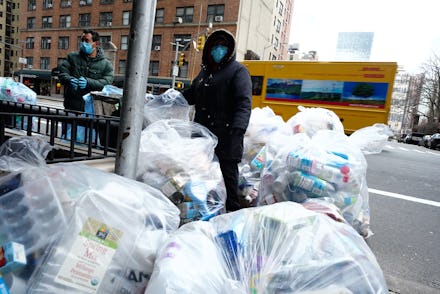Single-use plastic is making a comeback thanks to coronavirus

For those seeking silver linings in the ongoing coronavirus pandemic, the notable drop-off in air pollution has been a recurring bright spot. But while the skies might be clearing up (at least temporarily) while millions of people shelter in place, humans are poisoning the planet in other ways. Increased demand for medical supplies, households stocking up on tons of goods, and fears over COVID-19 spreading across different surfaces has single-use plastics on the rise — and as Wired reports, we're running out of places to put it.
As more plastic waste pours in, the already overwhelmed recycling system is at risk of getting completely buried. Prior to coronavirus, many recycling companies were already struggling to deal with the more than 300 million tons of plastic discarded every year — nearly 50 percent of which is single-use. According to the Earth Institute at Columbia University, only about 10 percent of all discarded plastic products in the United States actually get recycled — a fact the plastic industry knew for years while touting recycling programs that would never be viable. Nearly 75 percent ends up in landfills, where it can sit and erode for hundreds of years, releasing carbon dioxide as it degrades and often making its way into waterways and oceans. It's likely that as the country produces more plastic waste in this time of crisis, even more will be heading to landfills, as the already inundated recycling firms slow their operations. "Many recyclers, because of health and safety concerns, are also stopping the service,” Tom Szaky, CEO of recycling company TerraCycle, told Wired. “Recycling — that's been in sort of a crash — is now getting even worse.”
Those slowdowns are happening in tandem with a resurgence in single-use plastics. This is happening for a number of reasons, both out of necessity and potentially unfounded fears. Plastic bags have made a comeback during the coronavirus crisis due to concerns that reusable bags may carry the virus. A number of states and cities have reversed plastic bag bans and some have even instituted restrictions on reusable totes. While it is known that coronavirus can survive longer on certain surfaces, there doesn't appear to be any evidence that the virus is more viable on a cloth tote than a plastic bag, particularly if the bag is washed after use — though the plastic bag is likely to be discarded after one use, limiting additional exposure. With people worried that the virus can be transmitted through a number of surfaces, the demand for packaged goods is on the rise as well. According to FoodNavigator, demand for packaged goods has skyrocketed in Europe by as much as 111 percent for some items as compared to the previous year.
There is also the fact that the price of oil has dropped dramatically, which makes producing plastic goods cheaper than usual — and they aren’t all that expensive to begin with. Plastics are made from oil, and when the price of oil drops far enough, it can result in it actually being cheaper to produce new plastic products than recycle old ones. And when the demand for recycled goods disappears, more plastic ends up in landfills, slowly eroding and polluting the planet.
Plastic waste doesn't have the same effect as something like air pollution — we don't immediately see the damage as it occurs. But the change in our consumption habits will be immediately felt at the landfills that are already being overrun. It will be felt by oceans that are already at risk of having more pieces of plastic than fish by 2050. Even the short burst of uptick in plastic waste could cause significant disruption to the waste and recycling ecosystems. According to Waste Dive, dozens of cities and counties across the country have suspended recycling programs entirely. Rachel Meidl, a fellow at Rice University's Baker Institute, told Wired, “materials that would normally find its way to recyclers are being channeled to landfills and incinerators.” So before touting that "we are the virus" meme and spouting off to your friends about how the Earth is healing while we're all trapped indoors, remember that there are a lot of ways we can hurt the planet without ever leaving our couches.